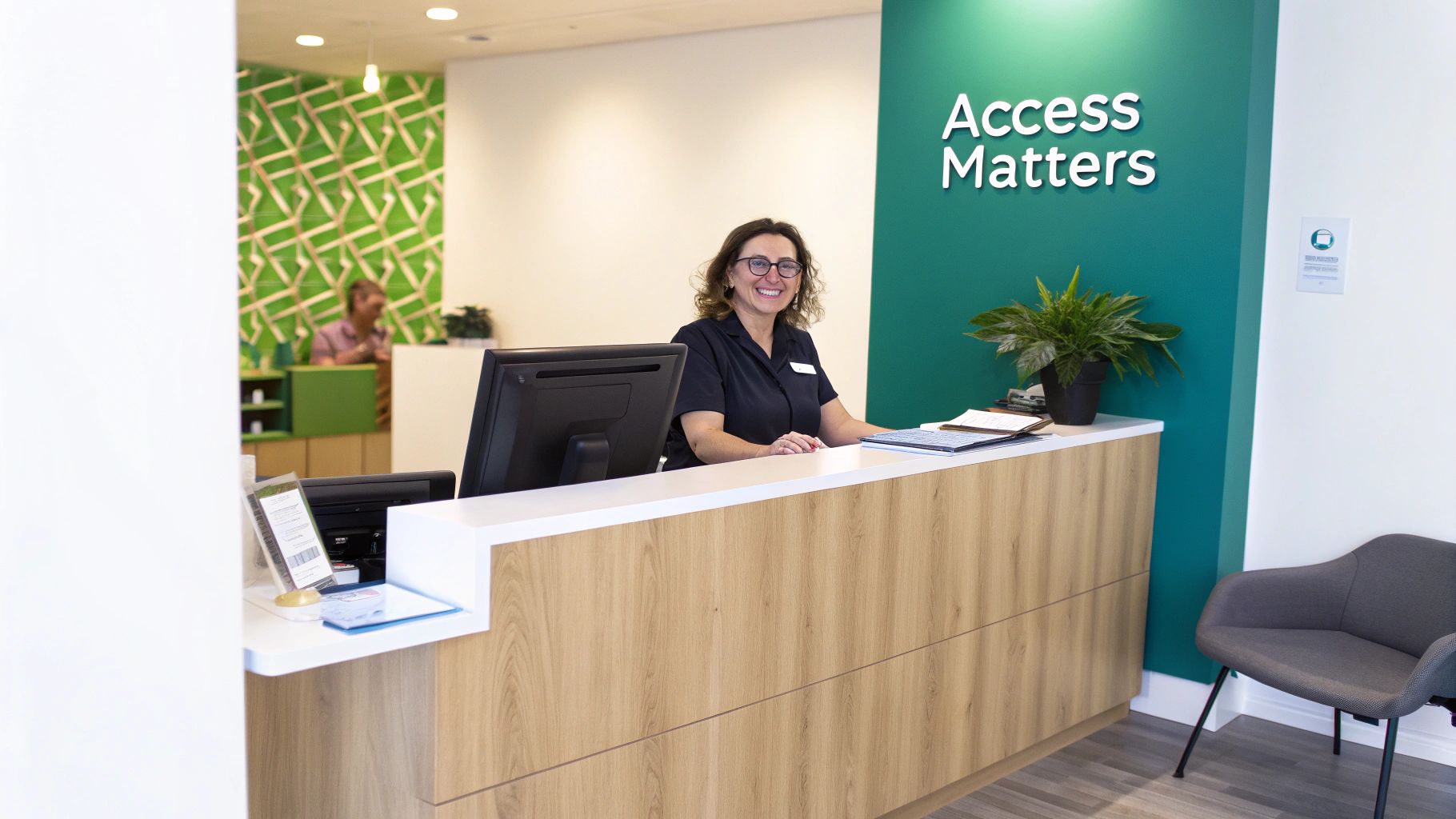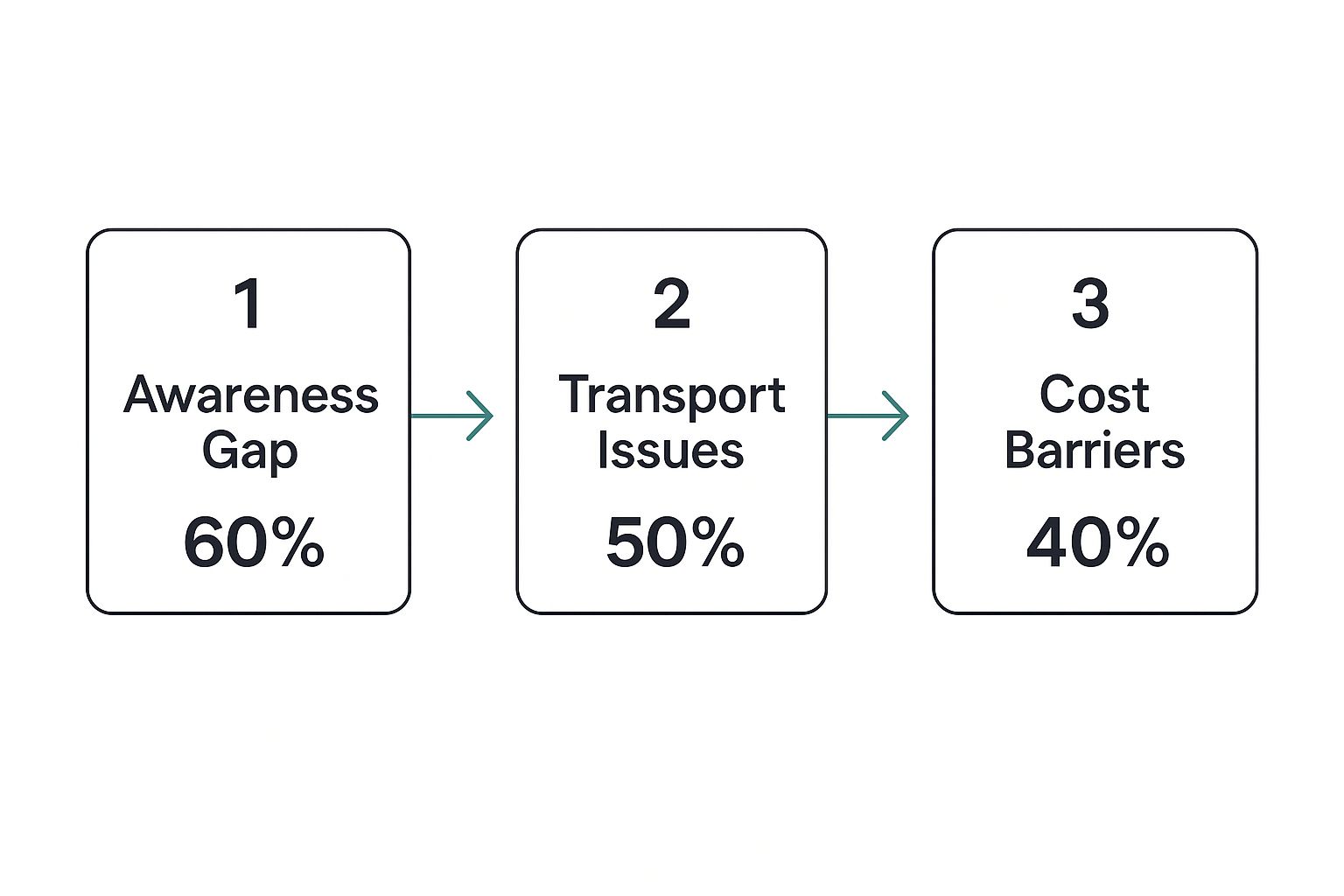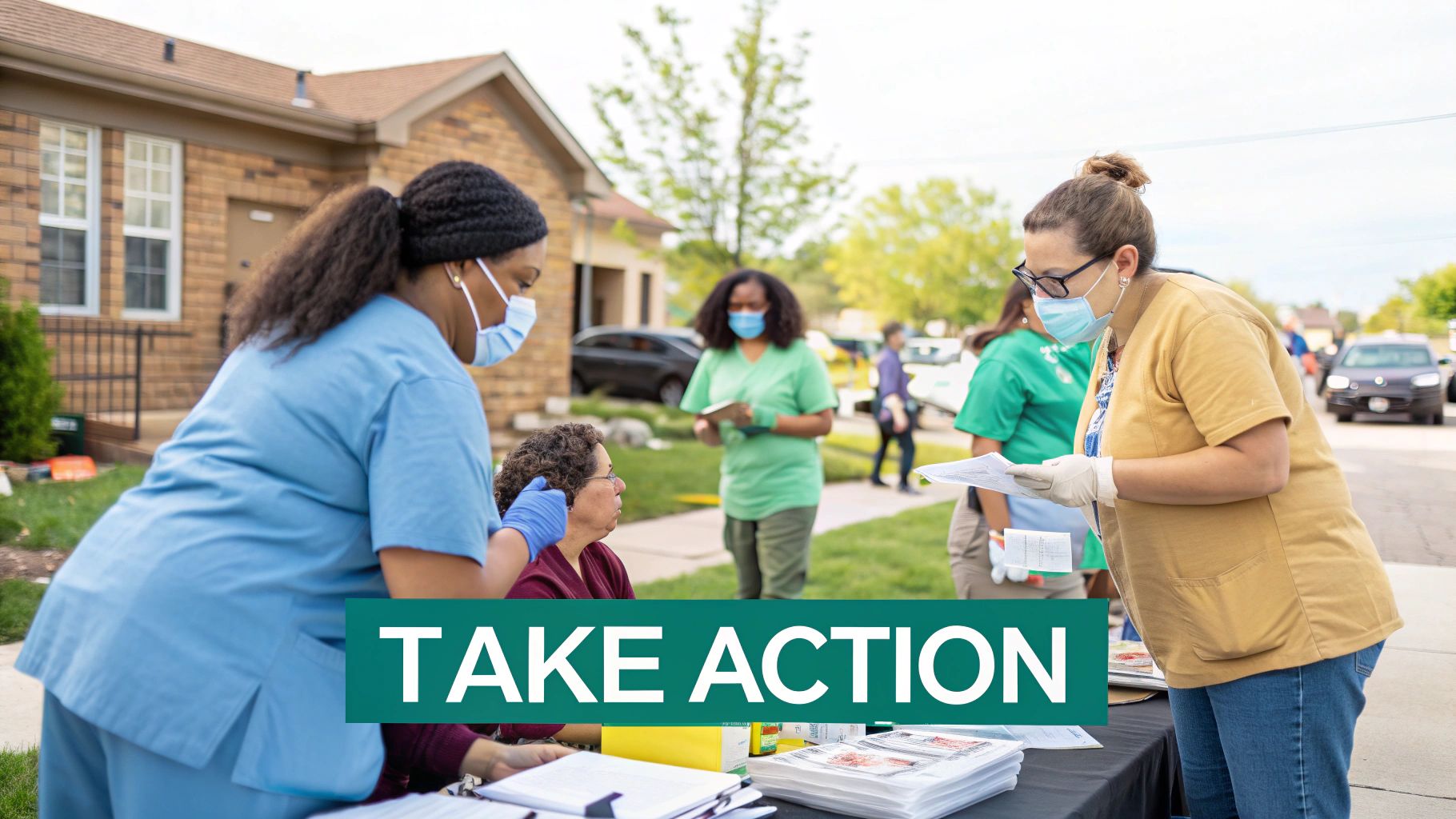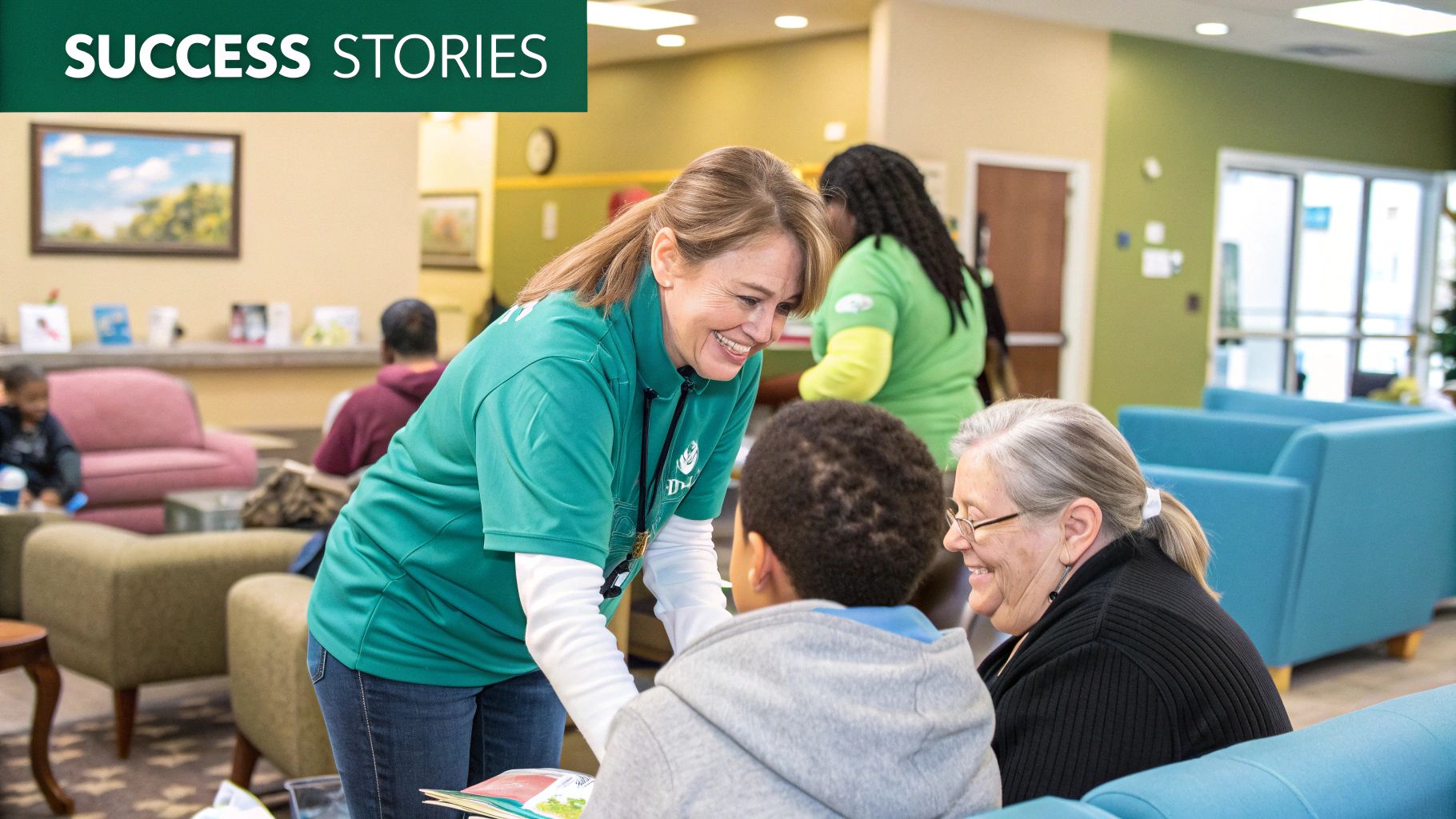Trying to find good, affordable healthcare can feel like a maze, especially when you're new to an area or your needs change. But the good news for residents of Boca Raton is that quality care is closer and more accessible than you might think. You just need to know where to look.
Your Guide to Local Health Resources in Boca Raton
If you're living at Cynthia Gardens or anywhere else in Boca Raton, finding the right medical, dental, or mental health services shouldn't be another source of stress. This guide is designed to move you past a simple Google search and give you real, practical steps for connecting with the community-focused care available right here in our city.
It’s about more than just locating a clinic. It’s about understanding the local health network so you can confidently make the best decisions for yourself and your family. Having a grasp on community health also means appreciating the work that goes into public health emergency preparedness, which keeps our entire community safer.
Why Community-Focused Care Matters
Community health centers are the bedrock of a healthy city. They're not just places you go when you're sick; they are hubs for preventative care and health education, helping people stay well from the start. What makes them so special is that they often design their services around the actual needs of the people living in the surrounding neighborhoods.
The core idea is simple but powerful: healthcare should be built around the people it serves. This approach ensures that care is not only accessible but also relevant and effective for the community's unique challenges.
This proactive, people-first model is gaining traction worldwide because it works. By fostering local collaboration, community health initiatives empower residents and build stronger, more resilient health systems for everyone. This method has proven especially vital for improving health access and equity.
Of course, access to great healthcare is a huge factor when deciding where to live. As you consider what makes a neighborhood the right fit, our guide on finding your ideal apartment in Boca Raton can help you look at the complete picture.
First Things First: What Does Your Family Really Need?

Before you even open a search browser, let's take a step back. The most common mistake I see people make is diving into a search without a clear idea of what they're looking for. This is what leads to dead ends and frustration. To successfully access community health resources, you first need a solid grasp of your family's unique medical situation.
Simply saying "I need a doctor" is too broad. Think about the specifics. Are you a new parent looking for a pediatrician to handle your toddler's immunizations? Or maybe you're helping an older relative find a specialist to manage a chronic condition like diabetes or asthma. Perhaps your top priority is finding a dentist who can see you for an urgent toothache, or a therapist for confidential mental health support. Each of these situations points to a different kind of provider.
Make a Quick Healthcare "Shopping List"
I always recommend creating a simple checklist. This isn't about writing a medical novel; just jot down the key needs for each person in your family. This little bit of prep work pays off in a big way.
A young professional's list, for instance, might look something like this:
- Annual physical and routine preventative screenings.
- Dermatologist referral for a persistent skin issue.
- Physical therapy options for a recent sports injury.
See the difference? Now, instead of just searching for any clinic, you're looking for one with dermatology connections or an on-site physical therapist. When you call a potential center, you can get straight to the point and see if they're a good match.
Having a clear list of needs is your most powerful tool. It lets you ask the right questions from the get-go and quickly weed out centers that can't help you. This makes your search to access community health services much more effective.
Your financial situation is the other major piece of this puzzle. Knowing your insurance status—whether you have private insurance, a student plan, or are currently uninsured—is crucial. It directs your search and helps you understand your payment options. Many community health centers are designed to serve everyone, but knowing your own situation helps you ask the right questions about sliding-scale fees or payment plans right away.
Finding Community Health Centers Near Cynthia Gardens
Once you have a clear idea of your family’s healthcare needs, the real work begins: finding the right facility. Thankfully, you're not just relying on word-of-mouth or old phone books anymore. Powerful online databases put a wealth of information about community health services right at your fingertips, accessible from your home at Cynthia Gardens.
Your best first stop is often a federal resource. The Health Resources and Services Administration (HRSA) website is the go-to directory for finding Federally Qualified Health Centers (FQHCs). These are clinics that receive federal funding to provide comprehensive and affordable care, making them an excellent option for many families.
The HRSA site features a simple search tool where you can plug in your address or zip code to see what's nearby.

Its direct, no-fuss approach is what makes it so useful. In just a few clicks, you get a map and a list of government-supported clinics in the Boca Raton area.
Getting Specific With Your Search
Let's say you need a clinic that offers both pediatric check-ups for your toddler and mental health counseling for a teenager. A generic search for "health clinics" will give you dozens of irrelevant results. This is where filters become your best friend.
Most modern health directories, including the HRSA site and local portals, allow you to refine your search. Look for options to filter by:
- Services Offered: Select "Pediatrics," "Dental," or "Behavioral Health" to instantly see who provides the care you need.
- Payment Programs: A filter for sliding fee discounts will immediately show you which centers base their costs on your income.
- Virtual Care: If you need flexibility, filtering for telehealth options can be a huge time-saver.
This turns what could be a frustrating afternoon of phone calls into a focused, efficient task. You're no longer just looking for a clinic; you're looking for your clinic.
To help you get started, I've put together a quick comparison of the most useful online tools for locating health services in and around Boca Raton.
Online Tools for Finding Boca Raton Health Centers
This table breaks down the best online resources for finding community health services. Each has its own strengths, so using a combination can give you the most comprehensive results.
| Resource/Tool Name | Key Feature | Best For Finding |
|---|---|---|
| HRSA Find a Health Center | Official federal directory of FQHCs | Federally funded clinics with comprehensive primary care and sliding fee scales. |
| 211 Palm Beach | Hyper-local resource and referral line | A wide range of social and health services, including mental health, housing, and food assistance. |
| Florida Department of Health | State-level health information and clinic locator | County health departments, specialized programs like WIC, and public health alerts. |
| GoodRx Health | Private-sector search with cost information | Comparing clinics, telehealth providers, and getting a general sense of local healthcare options. |
Using these tools strategically will give you a solid list of potential clinics to contact. Start with the HRSA and 211 sites for the most relevant community-focused options.
My Advice: Don't just find one clinic and stop. Create a short list of two or three promising options. This gives you a backup plan if your first choice has a long wait for new patients or doesn't feel like the right fit after you call.
Speaking of wait times, it’s important to be realistic. Even after you find the perfect center, getting an appointment can take time. Some programs report that scheduling a referral for specialty care can take more than 14 days. This is precisely why it pays to be proactive. Starting your search now, before you urgently need an appointment, gives you the breathing room to find the best care for your family near Cynthia Gardens.
How to Prepare for Your First Appointment

You’ve found a promising health center—great! A little prep work now can make that first visit incredibly smooth and productive. Knowing what to bring and what questions to ask beforehand is the key to getting the care you need without any added stress.
Before you head out the door, take a few minutes to gather some essential documents. Trust me, having everything ready will save you a ton of time and hassle at the check-in desk.
Here’s a quick checklist of what you'll likely need:
- A valid photo ID, like your driver's license or a student ID card.
- Proof of your Boca Raton address. A recent utility bill or a copy of your lease from Cynthia Gardens works perfectly.
- Income verification, such as recent pay stubs, especially if you want to apply for their sliding-scale fee programs.
- Any insurance cards you currently have. Don't worry if you don't have one; that's what these centers are for.
For students, I know this can feel like one more thing on an endless to-do list. But getting these documents organized is a small step that makes a big difference. It's a useful life skill, much like the ones we talk about in our guide to finding student housing in Boca Raton.
Questions to Ask When You Call to Schedule
When you call to book that first appointment, have a few questions ready. This is your chance to confirm the center is a good fit and to understand exactly what to expect.
Your goal on this call is simple: book your visit and make sure the clinic can truly help you. Don't hesitate to ask direct questions about services, costs, and what they require from new patients.
First, ask if they're accepting new patients and get a feel for the wait time to be seen. It's also smart to ask about the estimated cost for an initial visit, particularly if you’re uninsured.
Taking this initiative is so important. While global health access is improving, the World Health Statistics Report 2025 summary shows that universal coverage goals are still a work in progress. That makes it crucial for each of us to be our own best advocate and navigate the local resources available to us.
Figuring Out Payments and Insurance

Let's talk about the cost, because it's a real concern for everyone. The good news is that community health centers are built on the principle that quality care should be accessible to all, no matter your income. They've designed their entire payment system around making sure you can see a doctor when you need to.
The most common option you'll find is a sliding scale fee. It’s a pretty straightforward system: the amount you pay is adjusted based on your household income and the number of people in your family. To qualify, you’ll just need to bring some proof of income, like recent pay stubs. It’s a confidential process meant to take the financial pressure off.
Many centers also have dedicated staff who can walk you through applying for programs like Medicaid or the Children's Health Insurance Program (CHIP). These state programs can provide free or very low-cost coverage if you qualify.
What If I Have Private Insurance?
Even with private insurance, it's smart to do a little homework. Before you book an appointment, give the health center a quick call to confirm they are in-network with your provider. A five-minute phone call can save you from a surprise bill down the road. It’s a simple step, but one I’ve seen people skip, much to their later regret.
Remember, your financial situation should not be a barrier to wellness. Proactively understanding your options empowers you to seek care with confidence and avoid financial stress.
Keeping healthcare affordable is a huge piece of the puzzle when managing your budget, right alongside finding a place to live that doesn't break the bank. In fact, these two things often go hand-in-hand. You can see how these financial decisions connect in our guide on affordable apartments in Boca Raton.
To get a better handle on your health-related expenses, it's also incredibly helpful to compare different health insurance plans to ensure you have the best coverage for your specific situation.
Answering Your Top Questions About Boca Raton's Health Services
When you're trying to figure out local healthcare, it’s easy to get overwhelmed with questions. Knowing the answers is the first step toward feeling in control of your health. Let's walk through some of the most common things people ask.
The biggest question on just about everyone’s mind is insurance. What if I don’t have any?
Here's the good news: you do not need insurance to be seen at a community health center. These clinics were created to make sure everyone has access to care, no matter their income or insurance situation. They use what’s called a sliding scale, which simply means your bill is based on what you can realistically afford.
Another thing people often wonder about is what kind of care they can actually get. Are these places just for a quick check-up? Not at all. Think of them as your all-in-one health hub.
What's Typically Offered at a Community Health Center?
While every center has its own unique mix of services, most are set up to handle the community's core health needs. You can usually count on finding:
- Primary Medical Care: This is your home base for health—from yearly physicals and wellness checks to managing ongoing conditions like diabetes or high blood pressure.
- Dental Care: Many locations offer essential services like cleanings, x-rays, and fillings.
- Mental & Behavioral Health: Access to confidential therapy and counseling is a key part of what makes these centers so valuable.
- Women's Health: This often covers a wide spectrum, from routine exams and screenings to prenatal support.
Before you go, it’s always smart to give the specific center a call or hop on their website to see exactly what they offer. That way, there are no surprises.
The real power of these centers is their focus on holistic care. They don't just treat a symptom; they look at the whole person by bringing medical, dental, and mental health together under one roof.
This integrated model is more critical now than ever. In recent years, global health systems have been under immense pressure, making it tough for people to get consistent care. The number of people needing assistance has climbed to 300 million globally. In response, there’s been a major push to strengthen community-level primary and mental health services to bridge that gap. If you're interested in the bigger picture, you can read more in this 2025 health issues report from Project HOPE.
At Cynthia Gardens, we know that having great community resources right at your doorstep—especially for healthcare—is a huge part of what makes life in Boca Raton so special. Come see what makes our community the perfect place to call home.
